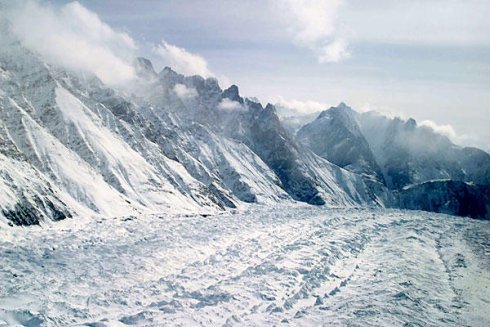Archives
AND MORE...

Emergency Meeting!
____________________

Shameful Chapter In American History
____________________

Murder Inc. Pays a Visit aka The Zone (2)
____________________

Temple of Doom
____________________
January 5, 2012
State Of Our Nation
In the latest news regarding our money or rather money we don't have,it appears the US taxpayer has been funding nearly half the budget of the UN's Intergovernmental Panel on Climate Change (IPCC), i.e., the UN's authority on "man-made global warming."
You can read about the $31 million funded (and wasted) below, but as you do, keep in mind that in addition to funding projects at Cesspool Central (aka the UN), the U.S. government has also adopted a new national security policy called Defunding & Releasing.
CNSNews.com | January 3, 2011
U.S. Taxpayers Cover Nearly Half the Cost of U.N.'s Global Warming Panel
By Elizabeth Harrington

Glaciers. (AP Photo)
(CNSNews.com) – A study by the Government Accountability Office (GAO) determined that the United States funded the Intergovernmental Panel on Climate Change (IPCC), the United Nations' authority on alleged man-made global warming, with $31.1 million since 2001, nearly half of the panel's annual budget.
The GAO also found that this funding information "was not available in budget documents or on the websites of the relevant federal agencies, and the agencies are generally not required to report this information to Congress."
In a Nov. 17, 2011 report, "International Climate Change Assessments: Federal Agencies Should Improve Reporting and Oversight of U.S. Funding," the GAO found that the State Department provided $19 million for administrative and other expenses, while the United States Global Change Research Program (USGCRP) provided $12.1 million in technical support through the U.S. National Science Foundation (NSF), averaging an annual $3.1 million to the IPCC over 10 years -- $31.1 million so far.
The IPCC runs an annual budget of $7 million, according to the Wall Street Journal, making the United States a major benefactor for its global warming agenda.
An international body, the IPCC was created in 1988. Though thousands of scientists contribute to the panel, only 11 working members support the organization. Set up by the World Meteorological Organization (WMO), the IPCC is an “effort by the United Nations to provide the governments of the world with a clear scientific view of what is happening to the world’s climate,” according to its Web site.
The organization has been the subject of controversy in the last several years when thousands of e-mails from the University of East Anglia's (UEA) Climatic Research Unit (CRU) were stolen and released in 2009, and again in November 2011, on the eve of climate talks in Durban, South Africa.
The e-mails included those between Michael Mann, the director of the Earth System Science Center at Penn State University and author of the infamous “hockey stick” graph that apparently showed global temperatures reaching “unprecedented” levels, and Phil Jones, director at CRU, which brought into question the validity of the IPCC’s work, with the reported statements “hide the decline,” and “Mike’s Nature Trick.”
In explaining its reason for auditing U.S. funding of the IPCC, the GAO said, “Interest in IPCC’s activities increased after the theft of e-mails among IPCC scientists was made public, and with the discovery of several errors in its 2007 set of reports.”
The IPCC's Fourth Assessment Report (AR4), released in 2007, included several errors, including claims that the Himalayan glaciers would melt by the year 2035, which the IPCC, in a statement, later admitted was based on inconclusive data.
After facing "key challenges" in determining the amount of funding to the IPCC, the GAO now recommends that U.S. funding be reported annually to Congress with "accurate and consistent information."
The report said documents on U.S. financing for the IPCC were "not available in budget documents or on the websites of the relevant federal agencies, and the agencies are generally not required to report this information to Congress."
Conflicting State Department numbers also made it more difficult for the GAO to assemble the data. The GAO "reviewed documents and interviewed officials from federal agencies and IPCC" to reach its findings.
A 2005 GAO report entitled "Federal Reports on Climate Change Funding Should Be Clearer and More Complete" found that federal funding for climate change was not adequately accountable. "Congress and the public cannot consistently track federal climate change funding or spending over time," the report concluded.
The report also found federal funding for global warming had increased by 116 percent between 1993 and 2004, to $5.1 billion.
The $3.1 million annual U.S. funding goes towards the IPCC's "core activities": meetings of the governing bodies, co-ordination meetings, support for the developing country co-chairs, the IPCC Web site and Secretariat. The IPCC assesses scientific information, but does not conduct any research of its own.
According to the U.S. Climate Change Science Program, the United States "has made the world's largest scientific investment in the areas of climate change and global change research" with a total of nearly $20 billion over the past 13 years.
Original article here.
Log In »
Notable Quotables
"Mr. Netanyahu is one of the most media-savvy politicians on the planet. On Friday he appeared live via video link on 'Real Time with Bill Maher,' taking the host’s alternately sardonic and serious line of questioning with gazelle-like alacrity."
~ Anthony Grant, jourrnalist who has written for many major newspapers and worked in television at Paris and Tel Aviv, interviewing former PM Benjamin Netanyahu on Monday, at the outset of Mr. Netanyahu's new book (more here).


